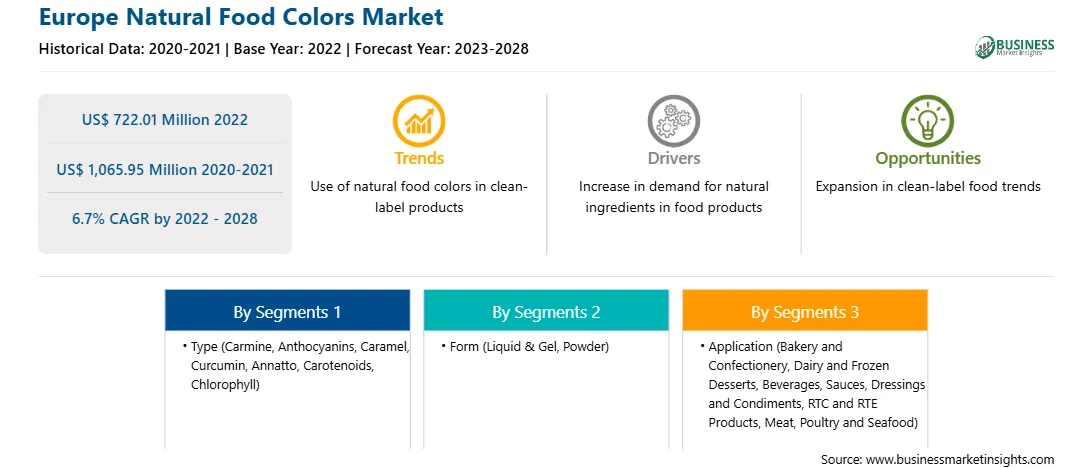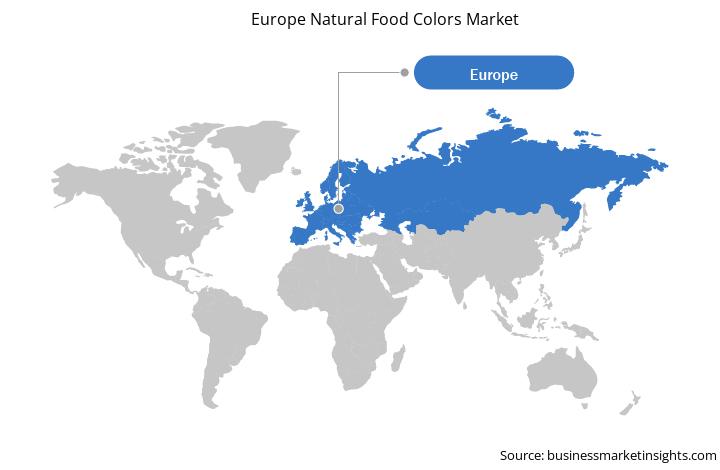欧洲天然食用色素市场预测至 2028 年 – COVID-19 影响和区域分析 – 按类型(胭脂红、花青素、焦糖、姜黄素、胭脂红、类胡萝卜素、叶绿素等)、形式(液体、凝胶和粉末)和应用(烘焙和糖果、乳制品和冷冻甜点、饮料、酱汁、调料和调味品、RTC 和 RTE 产品、肉类、家禽和海鲜等)
No. of Pages: 148 | Report Code: BMIRE00027585 | Category: Food and Beverages
No. of Pages: 148 | Report Code: BMIRE00027585 | Category: Food and Beverages
欧洲天然食用色素市场预计将从2022年的7.2201亿美元增长到2028年的10.6595亿美元。预计将以复合年增长率增长2022 年至 2028 年将增加 6.7%。
消费者对合成成分的担忧日益加剧
食物和食物由于对使用合成食用色素的担忧日益增加,饮料行业天然食用色素的用量显着增长。食用色素用于商业食品生产和家庭烹饪。它们还用于各种制药应用和化妆品。合成食用色素含有致癌的有毒污染物,会导致炎症加剧并破坏免疫系统的功能。多项研究表明,它也可能导致癌性肿瘤。合成食用色素成本低廉,外观改善且有吸引力,但也会引起儿童过敏。此外,FDA 还报告称,合成色素在幼儿中显示出癌症迹象。例如,在软饮料中,咖啡因被用作颜色,可能会导致心脏问题。因此,消费者对合成成分日益增长的担忧预计将推动天然食用色素的市场增长。
市场概览< /strong>
法国、德国、英国、意大利、俄罗斯等欧洲国家以及其他欧洲国家的需求量增加由于体育活动的增加和可支配收入较高的人口的增加,饮料,特别是运动饮料的需求增加。根据国际奥委会的数据,欧洲(俄罗斯、法国、德国、意大利、瑞典和捷克)代表奥委会的运动员人数最多(875人)。此外,在大流行期间和之后,随着天然色素、香料和甜味剂的使用增加,清洁标签、天然和有机产品的趋势加速。根据天然食用色素食品协会 (NATCOL) 的数据,2019-2020 年欧洲消费者对天然解决方案和含有天然着色剂的产品的需求为 62%。欧盟委员会禁止二氧化钛(E171)作为食品添加剂,因为研究表明它对人类健康有潜在危害。因此,食品制造商正在选择二氧化钛的天然食品色素替代品。这些对合成食用色素应用日益严格的监管限制预计将增加天然食用色素的创新和生产。此外,根据UNESDA报告,欧盟软饮料消费量约为469.235亿升。对软饮料、无酒精鸡尾酒和运动饮料等饮料的需求不断增长,加上消费者对天然食品的偏好,预计将推动天然食用色素市场的增长。
欧洲天然食用色素市场收入及 2028 年预测(百万美元)
欧洲天然食用色素市场细分< /strong>
欧洲天然食用色素市场分为类型、形式、应用和国家。根据类型,市场分为胭脂红、花青素、焦糖、姜黄素、胭脂红、类胡萝卜素、叶绿素等。类胡萝卜素细分市场在 2022 年占据了最大的市场份额。
Archer Daniels Midland Company、Aromata Group、BASF SE、Döhler Group、DuPont、Givaudan SA 、Koninklijke DSM NV、Naturex SA、Oterra A/S 和 Sensient Technologies Corporation 是该地区天然食用色素市场的领先公司。
Strategic insights for Europe Natural Food Colors involve closely monitoring industry trends, consumer behaviours, and competitor actions to identify opportunities for growth. By leveraging data analytics, businesses can anticipate market shifts and make informed decisions that align with evolving customer needs. Understanding these dynamics helps companies adjust their strategies proactively, enhance customer engagement, and strengthen their competitive edge. Building strong relationships with stakeholders and staying agile in response to changes ensures long-term success in any market.

| Report Attribute | Details |
|---|---|
| Market size in 2022 | US$ 722.01 Million |
| Market Size by 2028 | US$ 1,065.95 Million |
| Global CAGR (2022 - 2028) | 6.7% |
| Historical Data | 2020-2021 |
| Forecast period | 2023-2028 |
| Segments Covered |
By 类型
|
| Regions and Countries Covered | 欧洲
|
| Market leaders and key company profiles |
The regional scope of Europe Natural Food Colors refers to the geographical area in which a business operates and competes. Understanding regional nuances, such as local consumer preferences, economic conditions, and regulatory environments, is crucial for tailoring strategies to specific markets. Businesses can expand their reach by identifying underserved regions or adapting their offerings to meet regional demands. A clear regional focus allows for more effective resource allocation, targeted marketing, and better positioning against local competitors, ultimately driving growth in those specific areas.

The Europe Natural Food Colors Market is valued at US$ 722.01 Million in 2022, it is projected to reach US$ 1,065.95 Million by 2028.
As per our report Europe Natural Food Colors Market, the market size is valued at US$ 722.01 Million in 2022, projecting it to reach US$ 1,065.95 Million by 2028. This translates to a CAGR of approximately 6.7% during the forecast period.
The Europe Natural Food Colors Market report typically cover these key segments-
The historic period, base year, and forecast period can vary slightly depending on the specific market research report. However, for the Europe Natural Food Colors Market report:
The Europe Natural Food Colors Market is populated by several key players, each contributing to its growth and innovation. Some of the major players include:
The Europe Natural Food Colors Market report is valuable for diverse stakeholders, including:
Essentially, anyone involved in or considering involvement in the Europe Natural Food Colors Market value chain can benefit from the information contained in a comprehensive market report.